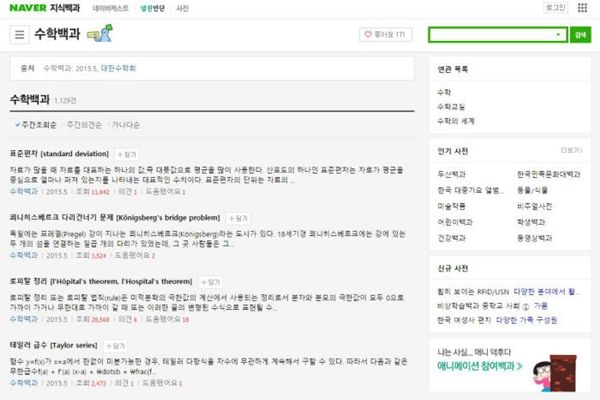Number of encyclopedias that Naver has been making since 2013 has surpassed 40. Naver has been making more than 10 encyclopedias per year and continues to improve quality of search engine by continuously establishing South Korean data with values. This is an investment that does not cling to marketability and induces popularization of knowledge ecosystem and virtuous cycle.
Naver made an announcement on the 9th that it has made total of 44 online encyclopedias since 2013.
Although they do not have marketability, Naver continues to work with experts to provide knowledge that is necessary in society and education. Considering the fact that it takes between one and two years to compile information, it is not easy to make more than ten encyclopedias per year. Annual investment alone costs about $8.96 million (10 billion KRW).
Naver has been working with variety of professionals and businesses such as professors, organizations, institutions, and publishers. Starting with ‘Media Encyclopedia’ that it made with a publisher called Communication Books, it has made encyclopedias in variety of fields such as ‘Mathematical Encyclopedia’ with Korean Mathematical Society, ‘Physical Encyclopedia’ with The Korean Physical Society, and ‘Looking at Unfamiliar Literature Closely’ with a publisher called Humanities and Liberal Arts. For ‘Educational Civilization Encyclopedia’, it worked with 230 professors. For ‘Psychological Words Encyclopedia’, it worked with Korean Psychological Association. It is also planning to introduce ‘Greece and Rome Mythology Encyclopedia’ in the near future.
Establishing encyclopedias with high quality is very important work for Naver. If ‘Knowledge iN’ provides information by utilizing intelligence in group, encyclopedias provide high-quality information that is accumulated from experts in variety of fields to users. This is the reason why Naver is active in making encyclopedias that are not associated with marketability.
“By considering the fact that base of Naver is search engine, encyclopedias with high quality are very important.” said Han Seong-sook who oversees businesses of Naver. “Existence of good web documents are must for good searches.”

Naver is contributing in popularization and virtuous cycle of knowledge ecosystem by establishing and preserving South Korean contents. ‘South Korean Pop Music Album 6000’ that was introduced recently is the first one to include trend of South Korean pop music and covers South Korea’s first pop music that was released in 1923 to music in 1990s. This is a first example that is systematized by classifying original and reissued albums. It is now easy to understand change of past pop music history that does not have much information.
For contents like ‘Media Encyclopedia’ and ‘Korean Fermented Food Encyclopedia’, they were published as books after their online encyclopedia contents were created. ‘Korean Fermented Food Encyclopedia’ is a prime example that has preserved Korean traditional culture by providing origins of Korea’s inherent fermented food and head families’ methods of cooking with World Institute of Kimchi. Naver held an exhibition offline and is also planning to provide second series of ‘Korean Fermented Food Encyclopedia’. Naver also worked on providing contents for sciences and engineering such as mathematics, physics, and civil engineering that are hard to find online.
“Although encyclopedias are important, they are not sold on publishing markets. It is a field that lacks investments due to lack of marketability.” said Kim Jong-hwan of Naver. “Naver is making qualitative contents through bold investments.”
Not only is Naver making its own encyclopedias, it is also working to move current contents such as past South Korean historical events to internet at the same time. In case of Korean-translated history of Goryo, it is the first time when a translated version and an original version are introduced on internet.
Responses from related industries and users are also positive. Naver classifies and establishes information that is difficult for publishers and academic societies to make on their own due to reasons such as cost and increases value of it by telling the public. Hankuk University of Foreign Studies utilized Literature Encyclopedia as a sub-material for a class called Japanese Literature. Korean Society of Civil Engineers has classified ‘Bridge Encyclopedia’ due to a proposal from Naver and introduced it to the public.
“Although we felt the necessity to systematize and organize history of cooking method of fermented food that is inherent to head families that are distinctive from each other, we had not thought about it too much due to low marketability.” said Department Head Park Chae-lin of World Institute of Kimchi’s Research Development Headquarters.
Staff Reporter Oh, Daeseok | ods@etnews.com